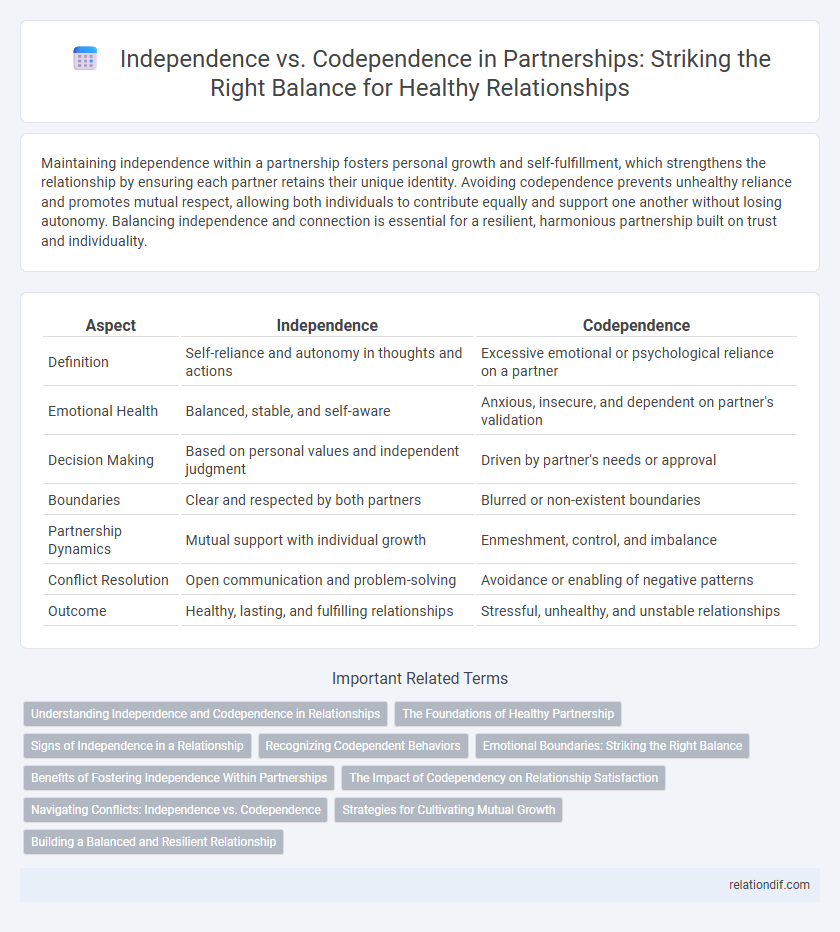Maintaining independence within a partnership fosters personal growth and self-fulfillment, which strengthens the relationship by ensuring each partner retains their unique identity. Avoiding codependence prevents unhealthy reliance and promotes mutual respect, allowing both individuals to contribute equally and support one another without losing autonomy. Balancing independence and connection is essential for a resilient, harmonious partnership built on trust and individuality.
Table of Comparison
| Aspect | Independence | Codependence |
|---|---|---|
| Definition | Self-reliance and autonomy in thoughts and actions | Excessive emotional or psychological reliance on a partner |
| Emotional Health | Balanced, stable, and self-aware | Anxious, insecure, and dependent on partner's validation |
| Decision Making | Based on personal values and independent judgment | Driven by partner's needs or approval |
| Boundaries | Clear and respected by both partners | Blurred or non-existent boundaries |
| Partnership Dynamics | Mutual support with individual growth | Enmeshment, control, and imbalance |
| Conflict Resolution | Open communication and problem-solving | Avoidance or enabling of negative patterns |
| Outcome | Healthy, lasting, and fulfilling relationships | Stressful, unhealthy, and unstable relationships |
Understanding Independence and Codependence in Relationships
Understanding independence in relationships involves recognizing the importance of maintaining personal boundaries, self-identity, and autonomy while fostering mutual respect and trust. Codependence occurs when partners rely excessively on each other for emotional support, often leading to imbalance and loss of individuality. Healthy partnerships balance independence and connection, promoting growth and emotional resilience for both individuals.
The Foundations of Healthy Partnership
Healthy partnerships are built on a foundation of mutual independence where both individuals maintain their own identities while engaging in shared goals and values. Emotional autonomy supports personal growth and honest communication, reducing the risks of codependence characterized by excessive reliance or control. Establishing clear boundaries and respecting each partner's individuality fosters trust, balance, and resilience in the relationship.
Signs of Independence in a Relationship
Signs of independence in a relationship include maintaining personal hobbies, strong boundaries, and confident decision-making without excessive reliance on the partner for validation. Partners who demonstrate financial responsibility, emotional self-regulation, and prioritize self-care embody healthy autonomy. This balance fosters mutual respect, individual growth, and sustainable connection.
Recognizing Codependent Behaviors
Recognizing codependent behaviors in a partnership involves identifying patterns such as excessive people-pleasing, difficulty setting boundaries, and an overreliance on a partner for self-worth. These behaviors often lead to imbalance, where one partner sacrifices personal needs to maintain harmony, undermining individual independence. Developing awareness of these tendencies is essential to fostering a healthy relationship based on mutual respect and autonomy.
Emotional Boundaries: Striking the Right Balance
Emotional boundaries in partnerships require a careful balance between independence and codependence to maintain healthy connections. Clear personal limits foster individual autonomy while allowing emotional support and intimacy to thrive. Establishing these boundaries helps partners avoid enmeshment and promotes mutual respect and self-expression.
Benefits of Fostering Independence Within Partnerships
Fostering independence within partnerships enhances personal growth, allowing each individual to develop unique skills and pursue personal goals, ultimately strengthening the relationship. Independent partners contribute diverse perspectives and maintain emotional balance, which reduces dependency-related conflicts and promotes mutual respect. Encouraging autonomy leads to increased trust and resilience, making the partnership more adaptable and sustainable over time.
The Impact of Codependency on Relationship Satisfaction
Codependency significantly decreases relationship satisfaction by fostering an imbalance where one partner's needs consistently overshadow the other's, leading to emotional exhaustion and resentment. This dynamic often undermines personal independence, causing partners to lose their sense of self and autonomy within the relationship. Restoring healthy boundaries and promoting individual growth are essential for enhancing mutual respect and overall relationship fulfillment.
Navigating Conflicts: Independence vs. Codependence
Navigating conflicts in a partnership requires balancing independence and codependence to maintain healthy boundaries while fostering mutual support. Partners who respect individual autonomy reduce resentment and promote personal growth, yet sharing responsibilities and emotions strengthens connection and trust. Effective communication and emotional intelligence help identify when independence enhances well-being and when codependence ensures collaborative problem-solving.
Strategies for Cultivating Mutual Growth
Effective partnership strategies emphasize balancing independence and codependence to foster mutual growth, ensuring each partner maintains personal goals while collaboratively supporting shared objectives. Implementing open communication protocols and setting clear boundaries enhances trust and empowers both individuals to contribute uniquely to the partnership's success. Regular feedback loops and joint problem-solving sessions drive continuous development, aligning individual strengths with collective aspirations.
Building a Balanced and Resilient Relationship
Building a balanced and resilient partnership requires fostering independence while maintaining healthy interdependence, allowing each partner to grow individually and together. Encouraging open communication and mutual respect helps prevent codependence, promoting emotional stability and trust. Strong relationships thrive when partners support personal goals and create shared experiences that strengthen their bond.
independence vs codependence Infographic

 relationdif.com
relationdif.com